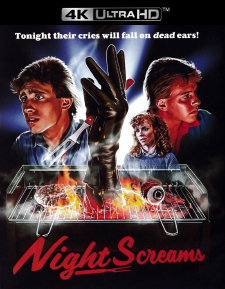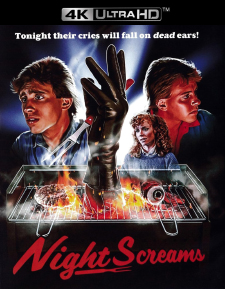Night Screams (4K UHD Review)

Director
Allen PloneRelease Date(s)
1987 (July 25, 2023)Studio(s)
Dill II Productions (Vinegar Syndrome)- Film/Program Grade: C-
- Video Grade: A-
- Audio Grade: B+
- Extras Grade: A-
- Overall Grade: A-
Review
Night Screams is a relatively late entry into the Eighties slasher movie cycle, a product of the regional horror and exploitation filmmaking scene that proliferated during the Sixties, Seventies, and Eighties. In this case, it was birthed straight from the heart of regional cinema in... Wichita, Kansas? Okay, so there never really was a regional filmmaking scene in Wichita, but if Pueblo, Colorado could give us Curse of the Blue Lights, then there’s no reason why Wichita couldn’t join in the fun. The biggest difference is that writer/director John Henry Johnson had gone out of his way to incorporate local lore into Curse of the Blue Lights, while Night Screams is a straightforward slasher that could have been shot pretty much anywhere. Yet it did feature enterprising young Kansas talent like writer/producer Dillis L. Hart II and co-writer Mitch Brian, although they ended up bringing in an outsider in the form of commercial veteran Allen Plone to helm the project after their first choice of director didn’t work out (he was fired after a couple of days).
The story that they concocted is pretty typical slasher fare, with a few minor twists along the way (including the identity of the killer, but surprise reveals are hardly unusual in the slasher milieu). There are actually two separate “A” and “B” stories in Night Screams that never really do come together, with the “B” story only serving as a red herring as well as a way to punch up the requisite blood and guts—although the distributors still didn’t feel that it had enough, so they resorted to a different trick in order to maximize the carnage (more on that in a moment). The “A” story is standard slasher fare, with a group of teenagers staying in a house while they’re slowly bumped off one by one, Ten Little Indians style. The “B” story offers a violent pair of escaped convicts who blast their way through police and civilians alike until they end up at the same house. Are they the ones who are responsible for killing the teens? Obviously not, since the prologue clearly sets up the fact that there’s something else going on behind the scenes. In the end, the two escapees are just more potential fodder for the real killer. Night Screams stars Joseph Paul Manno, Ron Thomas (Bobby in The Karate Kid and Cobra Kai), Randy Lundsford, Megan Wyss, Janette Allyson Caldwell, Dan Schramm, Susan Lyles, Jerry Goehring, and many other faces that most people won’t recognize.
Not surprisingly for a low-budget regional production, Night Screams was coming up a little short on its running time, so the distributor Overseas Film Group decided to pad things out by incorporating footage from the 1981 slasher movie Graduation Day. They did so as openly as possible, too—it’s the film that that’s playing on television during the prologue (it’s even identified in the dialogue as Graduation Day). Mind you, that’s not the only padding that was added to Night Screams, since it also incorporates footage from the Swedish Erotica short Ski Bunnies 2 starring John Holmes, Seka, and Desiree Cousteau, just to spice things up in a different way. (You got your nudity, you got your sex, you got your violence—what more could anybody ask for in a slasher title?) Neither Plone nor the producers were involved with that process, and it’s something that they regret to this day.
Since Night Screams was produced on a shoestring, it doesn’t feature much in the way of sets, with a couple of Wichita homes serving as the principal locations, and there’s not much in the way of set dressing either. One of the characters is shown going through a record collection that probably belonged to the owners of the house, with the Amy Grant album Unguarded visible at the bottom of the stack, and it’s safe to assume that the product placement wasn’t approved by Grant. (There’s also a copy of the soundtrack to Flash Gordon on display, so the owners were certainly eclectic.) The kills are fairly inventive if not necessarily unique, and while some of the actors playing teenagers are visibly too old for their roles, they’re... well, they’re adequate, anyway. The person playing the secret killer does have a field day after the big reveal, but in the best slasher tradition, Night Screams is mostly about the carnage. As Carol Clover explained in her seminal 1992 book Men, Women, and Chainsaws: Gender in the Modern Horror Film, contrary to popular belief, watching horror is really more of a masochistic experience than a sadistic one. Rather than sympathizing with the killers, most viewers empathize with the victims instead, wincing at what’s happening onscreen. In that sense, Night Scream does deliver the gruesome slasher goods.
Cinematographer Eric Anderson shot Night Screams on 35 mm film using spherical lenses, framed at 1.85:1 for its theatrical release. (While it went straight to video in the United States, it did receive a limited theatrical release in Europe.) This version uses a 4K scan from the original camera negative, and the results are quite impressive for a film of this type. There’s still some light damage remaining that includes speckling and small scratches, but most of the those are of the single-frame variety, so they won’t be noticeable unless you’re looking for them. Needless to say, the dupe footage from Graduation Day and Ski Bunnies 2 looks softer and grainier, but everything else is sharp and clear, with nicely resolved fine detail. The grain is managed perfectly by Vinegar Syndrome’s typically robust encoding, and the High Dynamic Range grade (only HDR10 is included on the disc) provides vivid but natural-looking colors. The contrast range offers deep blacks and a few brighter highlights, but it all seems faithful to the intended look for Night Screams.
Audio is offered in English 2.0 DTS-HD Master Audio, with optional English SDH subtitles. Night Screams was released theatrically in Ultra Stereo, so it’s a four-channel surround mix matrixed into two, but the reality is that the bulk of the dialogue and sound effects are mono and steer straight to the center channel. The only real stereo spread and surround activity is provided by the score from Michael Linn and the occasional piece of source music. (No, they never do play either Amy Grant or anything from the Flash Gordon soundtrack.) Otherwise, the dialogue is always clear, and there’s a bit of heft from the music and effects.
Vinegar Syndrome’s 4K Ultra HD release of Night Screams is a 3-Disc set that includes a Blu-ray with a 1080p copy of the film, as well as a second Blu-ray with a reconstruction of the pre-release version as originally intended. The insert is reversible, with new artwork on the one side and the original theatrical poster artwork on the other. There’s also a spot gloss slipcover available directly from Vinegar Syndrome, limited to the first 6,000 units, that was designed by Chris Barnes. The following extras are included, all of them in HD:
DISC ONE: THEATRICAL CUT (UHD)
- Audio Commentary by Allen Plone and Eric Anderson
DISC TWO: THEATRICAL CUT (BD)
- Audio Commentary by Allen Plone and Eric Anderson
- Blood and Chopsticks: Echoes of Night Screams (HD – 80:06)
- Theatrical Trailer (HD – 2:03)
The commentary features Allen Plone and Eric Anderson, moderated by Vinegar Syndrome’s Ewan Cant. Plone admits that it’s the first time that he’s watched Night Screams in 35 years, and addresses the issue of the added footage right up front—he’d never seen any of it prior to sitting down to record the commentary. They explain their backgrounds working together prior to being hired for Night Screams, and offer plenty of stories about making the film. Their memories are a little shaky at times, but Cant does a good job of filling in any gaps in the information that they provide. Still, none of them can explain some of the outtakes that play during the closing credits—parts of Night Screams will simply remain a mystery for all times.
Blood and Chopsticks is a feature-length documentary about the making of Night Screams. Needless to say, there wasn’t any behind-the-scenes footage available, but Vinegar Syndrome managed to round up an impressive set of cast and crew to sit down for interviews. That includes actors Megan Wyss, Ed Baker, Mike Roark, Susan Lyles, and Dennis Arnold, as well as writer/producer Dillis L. Hart, executive producer Richard Caliendo, Eric Anderson, Allan Plone, makeup effects artist Diana Lee-Sottler, and makeup/special effects artist Tim McGill. They cover the genesis of the project, filming in Wichita, the casting (commemorating those who have passed away), shooting the kills, the editorial process, the release, and the film’s legacy. Everyone shares their negative reactions to the added footage from Graduation Day and Ski Bunnies 2—Plone in particular says that he’s a bit disturbed to have his name attached to a film that includes material like that. It’s a thorough dissection of the process of making a regional production with little in the way of resources. Watch to the end for a surprising personal note from one of the participants, and there are a few interesting bumpers during the closing credits, too.
DISC THREE: PRE-RELEASE CUT (BD)
- Introduction with Richard Caliendo and Dillis L. Hart II (HD – :30)
There really isn’t a director’s or producer’s cut of Night Screams, since all of the padding was added during the original editorial process, and as a result it was cut into the negative. This version is an attempt to re-construct what was originally intended minus all the padding. The process was complicated by the fact that there’s no sound mix that doesn’t include the extra footage, but they did their best to smooth over the deletions. (The movie being watched during the prologue is still identified as Graduation Day, even if it’s not actually shown.) The reconstruction uses the same 4K restoration as the theatrical cut of Night Screams, so it offers similar quality (albeit at 1080p resolution minus the HDR), as well as 2.0 DTS-HD Master Audio. It plays with a brief introduction from Caliendo and Hart, explaining how this is their original vision for the film.
At first glance, that may not look like a broad collection of extras, but the addition of an all-new re-creation of the original cut is a big deal. More importantly, one quality making-of documentary is worth its weight in standalone interviews—arguably more so, since there’s less repetition and more visual variety. Any way that you slice it, this is an impressive release of Night Screams from Vinegar Syndrome, and a worthy addition to the library of any fan of Eighties horror.
- Stephen Bjork
(You can follow Stephen on social media at these links: Twitter and Facebook.)

